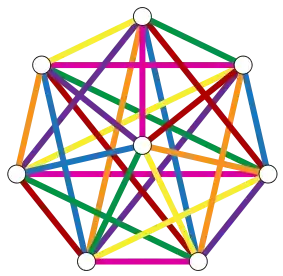Apologies in advance as I'm a programmer, not a mathematician. I am working on organizing pair programming in teams. So I have a set of individuals, and I want to work out all the possible unique pairing combinations so that we can have a set of pairs each day that ensures that no one re-pairs with the same person for the longest possible time.
For example, given 8 programmers:
- ["Pablo", "Dan", "Andrew", "Tom", "Rob", "Jay", "Norm", "Yev"]
I would like to be able to quickly work out a set of 7 unique possible combinations of pairs that will allow everyone to pair with someone different every day for 7 days in a row:
- [["Pablo", "Dan"], ["Andrew", "Tom"], ["Rob", "Jay"], ["Norm", "Yev"]]
- [["Pablo", "Andrew"], ["Dan", "Tom"], ["Rob", "Norm"], ["Jay", "Yev"]]
- [["Pablo", "Tom"], ["Dan", "Andrew"], ["Rob", "Yev"], ["Jay", "Norm"]]
- [["Pablo", "Rob"], ["Dan", "Jay"], ["Andrew", "Norm"], ["Tom", "Yev"]]
- [["Pablo", "Jay"], ["Dan", "Rob"], ["Andrew", "Yev"], ["Tom", "Norm"]]
- [["Pablo", "Norm"], ["Dan", "Yev"], ["Andrew", "Rob"], ["Tom", "Jay"]]
- [["Pablo", "Yev"], ["Dan", "Norm"], ["Andrew", "Jay"], ["Tom", "Rob"]]
I've written some ruby code that does this for me:
https://github.com/tansaku/pair_organiser/tree/86a1ebc1dc41b0d89cdf2116cda1f2913a28c6de
However it uses some randomization to search the space of possible pairings and it sometimes gets stuck. I've managed to get it to work for a group of up to 34 individuals, but it gets stuck like 5 or 6 times, with me needing to kill the process each time, before I eventually get a run that generates the necessary solution.
Now that's fine for the time-being, as once we've generated the correct solution for a team we can just use that solution, but it would be great to know if there is a simpler approach that would guarantee a solution. I've been searching around on the web and found a few related posts:
- https://stackoverflow.com/questions/10568081/partitioning-a-sequence-into-sets-of-unique-pairs
- Double Factorial: Number of possibilities to partition a set of $2n$ items into $n$ pairs
but I don't think that anything else I've found is addressing quite the same problem ... although I might well be wrong. Any advice or ideas very much appreciated
